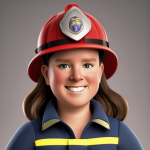A child clutches a favorite blanket. A runner pauses to steady their breathing. A student drums fingers rhythmically on their desk. These instinctive acts of self-soothing have long fascinated psychologists, but measuring them has proved elusive. Mental health professionals and researchers have now gained a cutting-edge instrument for measuring how people cope with stress. The Self-Comforting and Coping Scale (SCCS), developed by respected UK-based lecturer Dr. Kennedy Oberhiri Obohwemu, finally provides researchers with a comprehensive framework for assessing those little self-soothing behaviors we all use during times of distress.
“Self-comforting is an overlooked but fundamental dimension of coping,” explains Dr. Obohwemu, whose passion for the subject shines through as he discusses the scale he developed through extensive research and validation studies. “With the SCCS, we are not just measuring behavior—we are redefining how we understand emotional self-regulation and psychological resilience.”
The innovative scale, detailed in a recent publication, examines 13 distinct dimensions of self-comforting, ranging from cognitive reframing to mindfulness and goal adjustment. While psychologists have spent decades studying resilience and emotional regulation, surprisingly, the specific behaviors people naturally use to self-soothe have remained largely unmeasured until now.
Running parallel to the scale is a fascinating new theoretical framework called the Self-Comforting and Coping Theory (SCCT). The theory, published in the Global Journal of Humanities and Social Sciences, suggests that individuals who actively engage in self-soothing practices tend to demonstrate better adaptive coping and experience notably reduced stress-induced dysfunction.
Real-world applications of the SCCS have already begun to emerge across multiple fields. Mental health professionals are increasingly using it to assess the difference between helpful and potentially harmful self-comforting strategies. Meanwhile, forward-thinking educators and workplace leaders are exploring its potential for preventing burnout and fostering emotional wellbeing among their students and employees.
Looking ahead, Dr. Obohwemu and his dedicated research team are now focusing on expanding the scale’s applications across diverse populations through carefully designed longitudinal studies. Their ongoing cross-cultural validation studies, documented at TheScoreStudy.com, aim to ensure the SCCS remains globally applicable. One particularly promising application is being tested in academic settings, where researchers are examining how self-comforting techniques might help students cope with academic failure.
This thoughtful combination of scientific rigor and practical application positions the SCCS as more than just another assessment tool—it represents a meaningful step forward in our understanding of stress management and resilience-building. For those working in mental health, education, or organizational development, the SCCS offers a fresh perspective on how we might better support individuals through life’s inevitable challenges.










